The idea of living longer, healthier lives thanks to rejuvenation biotechnology has steadily become more common. Gradually increasing numbers of articles are discussing this idea, especially as science is starting to catch up and may eventually even deliver on it.
With that in mind, I was pleasantly surprised this week to be greeted by an interesting questionnaire from YouGovChat. YouGov PLC is an international, Internet-based market research and data analytics firm that has a headquarters in the UK.
Public sentiment on living forever or at least indefinitely
The question that caught my attention was: “If you could live forever, staying healthy and young, would you do it?”
The important part here is that this question includes the words healthy and young. Previous surveys have often asked this question without those important words, and that changes the response.
People don’t generally want to live longer if that additional time means being sick and frail. Simply asking people if they want to live another 20+ years often conjures up images of being in a care home. They think of having no independence or quality of life accompanying those extra years.
This is understandable. The modern healthcare system has done well in keeping people alive longer, but often without an accompanying quality of life. The idea of effectively losing what makes life worth living and prolonging suffering isn’t something desirable.
However, phrasing the question with such qualifiers can lead to a more accurate and honest answer. So, how did people respond when the question was framed with the understanding that health and youthfulness are included?
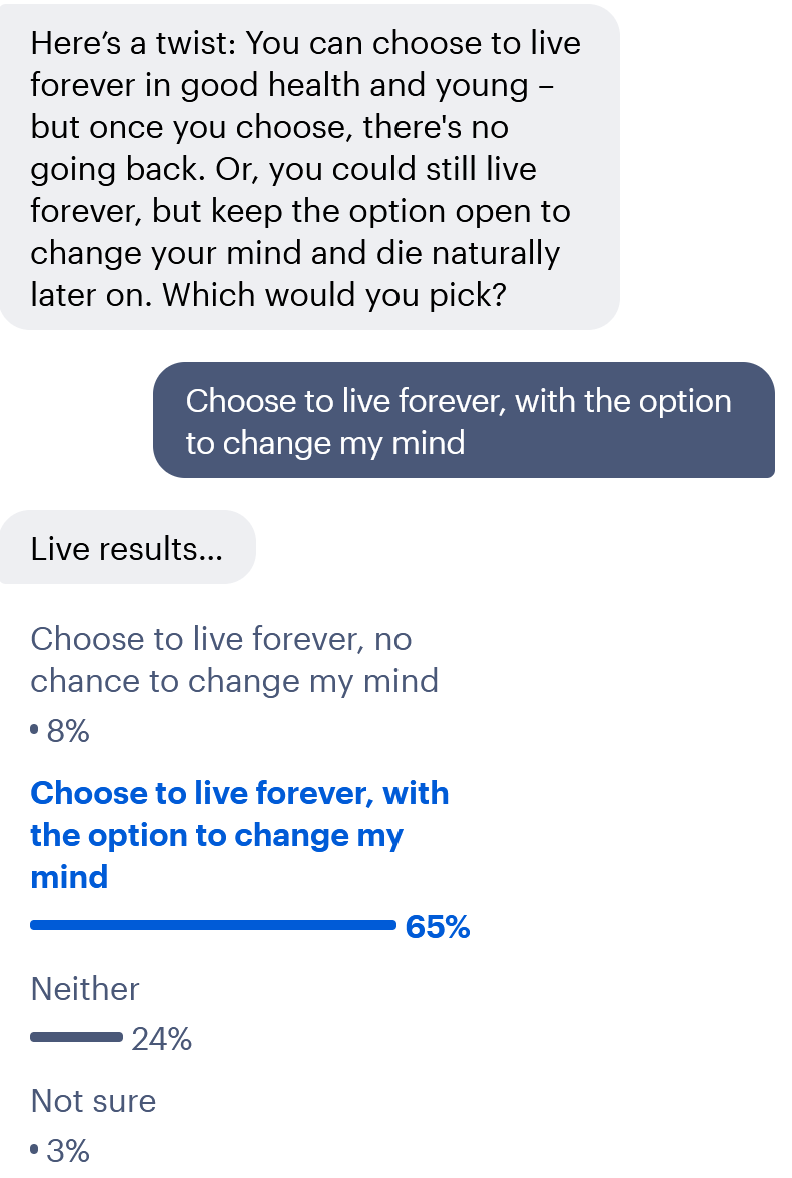
The key thing to note here is that most people in the poll were open to living long and healthy lives. However, they wanted the choice to end their life if they so desired.
In my decade as a rejuvenation biotech journalist, I have heard many reasons not to develop the technology. One of those objections is that people will be forced to take therapies and made to live longer or even indefinitely against their will.
Some of that concern may be playing into the responses here. People are likely to prefer to have such an option than not, and no one likes the idea of having no choice. We cannot truly know why people responded this way, as it was beyond the scope of the poll. On the plus side, the majority don’t appear to be against the idea.
The meaning of life
The next question got into the philosophical side of things and touched upon something often used to justify death.
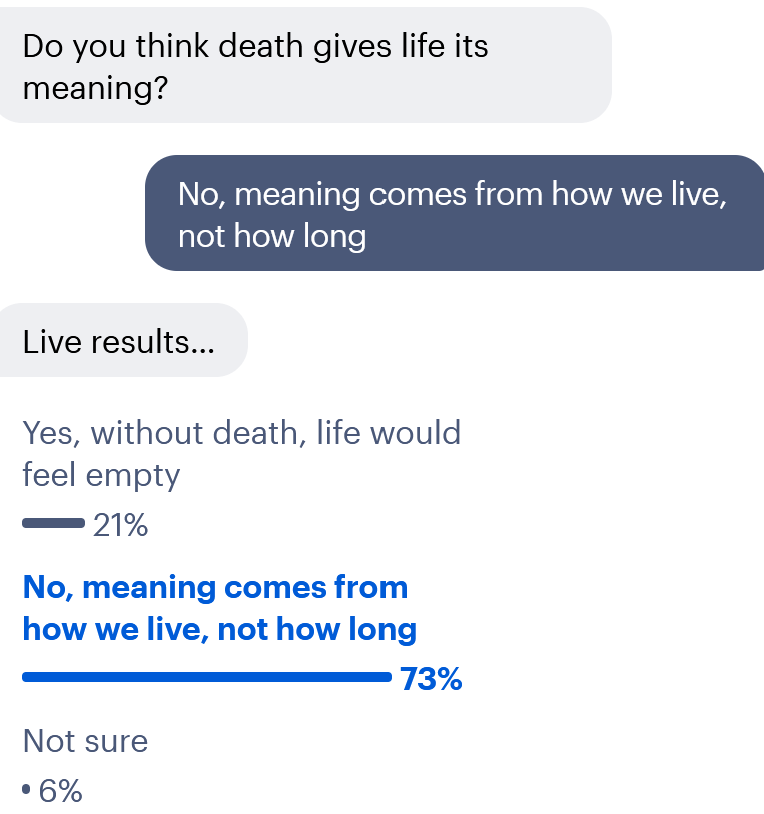
The idea that death makes life meaningful has long been used to rationalize death. It is also used as a reason for not trying to reverse biological aging to prevent age-related diseases.
There is nothing at all wrong with growing chronologically older and hopefully wiser, but getting biologically older is the primary risk factor for a myriad of such diseases. Our field is focused on slowing down and even reversing the damage that aging causes to organs and tissues. The goal is to keep people biologically younger and healthy for longer.
It is good to see that these responses largely reject the idea that death is needed to make life meaningful. Unfortunately, the set answers focused on how we live and not how long, which kind of defeats the point of the original question, especially since most of the respondents had expressed positive attitudes towards indefinite lifespans.
Feeling a bit emotional about longevity
The next question delved into the emotional side of the human experience.
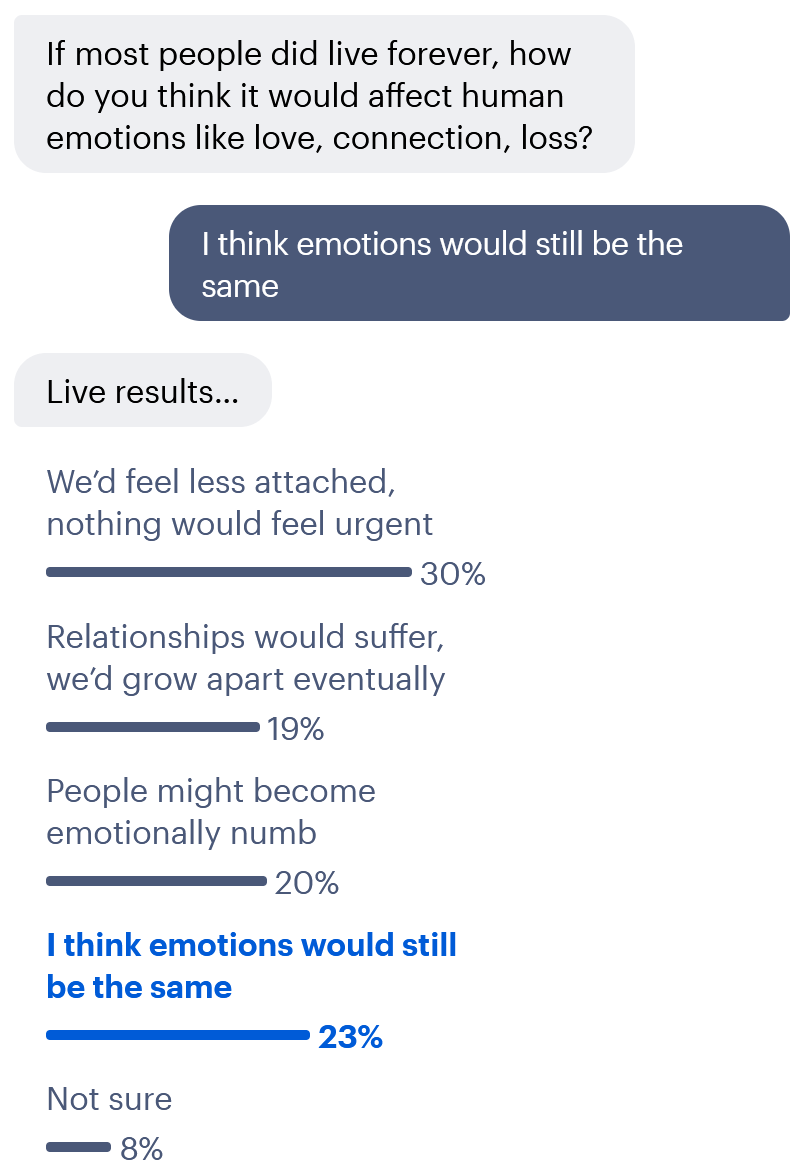
While it is not possible to know how longer lives might affect human emotions, we have explored some related concerns. We covered the idea that longevity might lead to eternal boredom and why this is unlikely. The concept that society would stagnate if people lived longer is something that we have also written about. We have also touched upon lost motivation due to increased lifespans.
The truth is that we do not know if or how living indefinitely might change the human experience, assuming it would, but I don’t agree that it’s a reason to let people die from potentially curable age-related diseases.
I prefer to think that given more time, people would use that extra time to focus on long-term plans and ambitions. If you have more years of health and youth, it’s easy to picture having many careers, hobbies, and interests.
We still have a long way to go to get the public on board
The penultimate question itself was reasonable, as it asked about the support of research into indefinitely increasing human lifespans. The issue here is that the set answers included the very loaded “Yes, humans should aim to conquer death”.
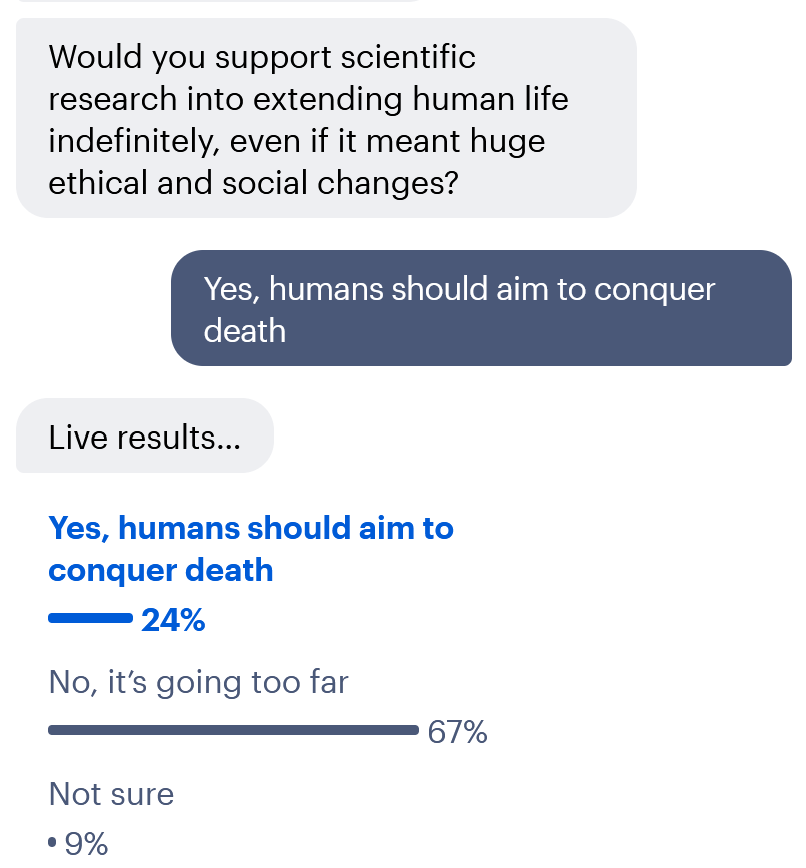
The problem is that this isn’t what our field of science is trying to do. Let’s be clear here, rejuvenation biotechnology is not immortality. The goal of the field is not to conquer death. It is to prevent or reverse age-related diseases by targeting the causes of aging.
Rejuvenation won’t stop you from dying in a car crash. It can’t save you from falling off a tall building. While it may improve the immune system, it won’t necessarily prevent death from an infectious disease. There are many ways to die, and only age-related diseases are covered by our field, nothing else.
Even if people have an indefinite lifespan it does not equate to conquering death or immortality. This is why I think this particular question is flawed, because the responses miss the point of rejuvenation biotechnology. As a result, the answers people give here are based on that poor framing.
This is why there is a contradiction in their responses. They are mostly fine with living indefinitely according to their responses earlier in the poll, but they are against it later. It would be great to see these questions asked again with better framing for this particular question. I am willing to bet that the answers would be more in favour of supporting research if the question and answers are framed properly.
Back to the meaning of life again
The poll already touched upon the old idea that death gives life meaning, but for some reason, the poll makers chose to return to the same question in a different way, despite the fact that the majority had already rejected the notion that death made life meaningful.
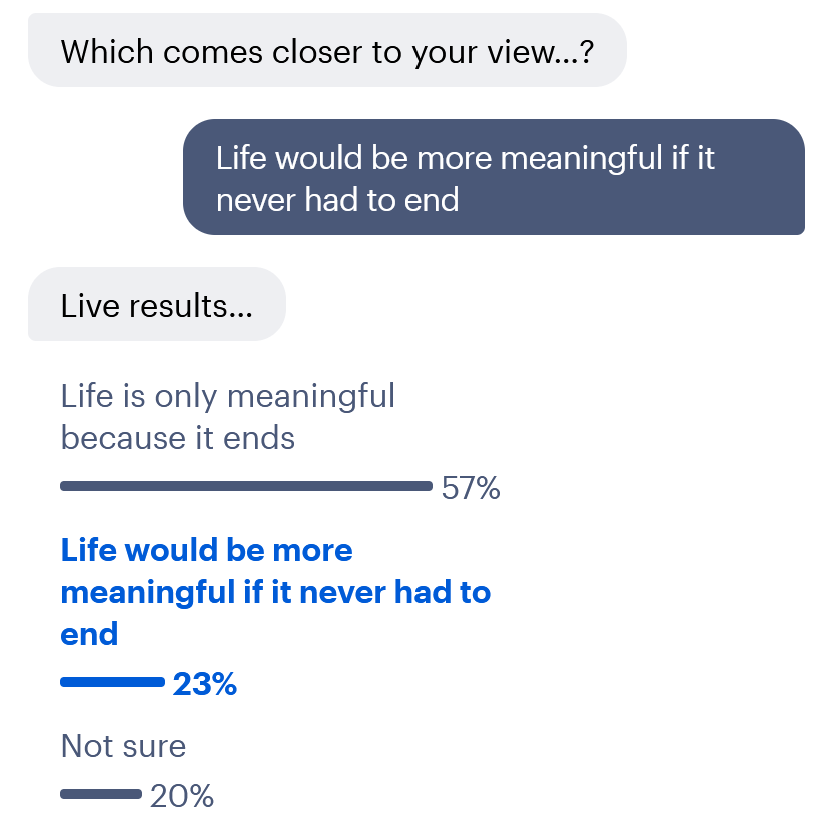
However, we see a shift and somewhat of a contradiction, again because the framing changed. Phrased this way, more people think life has meaning because it ends, so that presumably means death makes it meaningful.
Ultimately, these results suggest that how a question is asked, along with the possible answers, is really important. I believe the main point is that the poll shows the topic is reaching more public audiences. A decade ago, I would never have dreamed to see something like this, but here we are now with the subject being discussed.
An important caveat
While this is interesting, there are important caveats here. The UK government and other organisations make use of the data collected by YouGovChat, although the extent to which this information is used is unknown.
In other words, while this is interesting, the data should be taken with a pinch of salt. Polls such as this have known limitations. They do not represent the entire population, they are only suggestive of the general sentiment.
If you want to take part and are from the UK, you can join the “Would you choose to live forever if you could?” poll.
Help us to build better advocacy tools and ask the right questions
Public trust is the key that opens all other doors. For a long time, longevity research has needed better tools to understand public opinion. This will help to build trust.
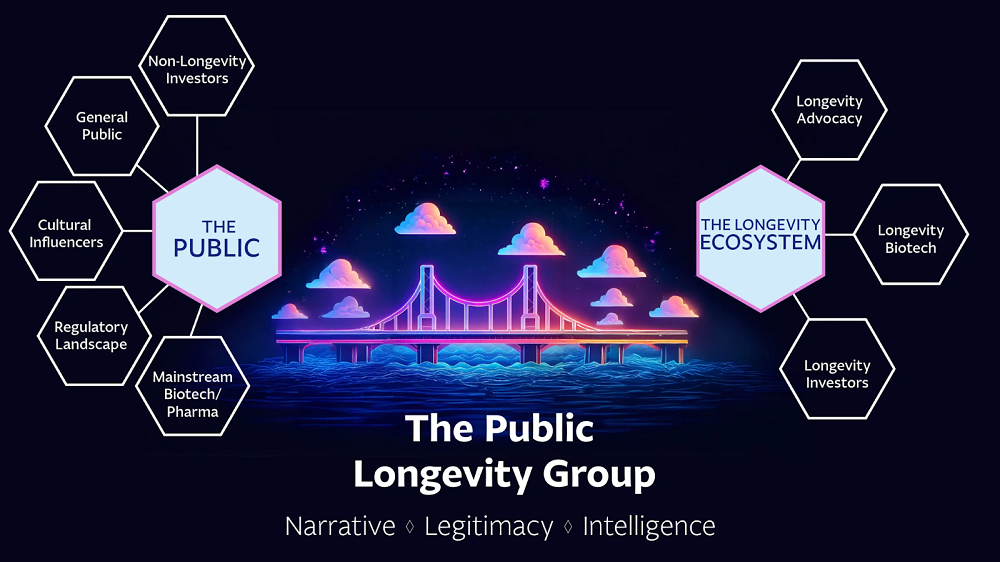
To achieve this, we are supporting the development of a cultural intelligence platform by the Public Longevity Group (PLG). The objective is to develop tools for assessing public opinion by evaluating media coverage and analyzing social media engagement in the area and to formulate effective communication methods to connect with previously overlooked audiences.
Thanks to your support, we are more than halfway to the fundraiser goal, but there’s still time to make an even greater impact!
The LRI Board of Directors is matching all donations up to $25,000 to push us over the finish line. Every dollar you give will be doubled. This will help launch the first data-driven sentiment analysis engine for longevity science.
Donate today, and join us in building the tools for effective longevity advocacy!
View the article at lifespan.io








































